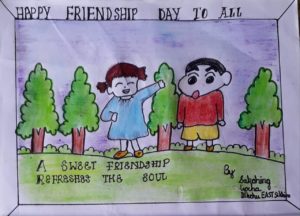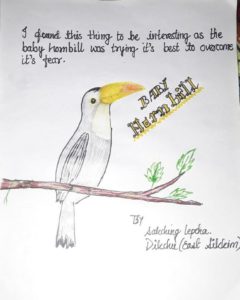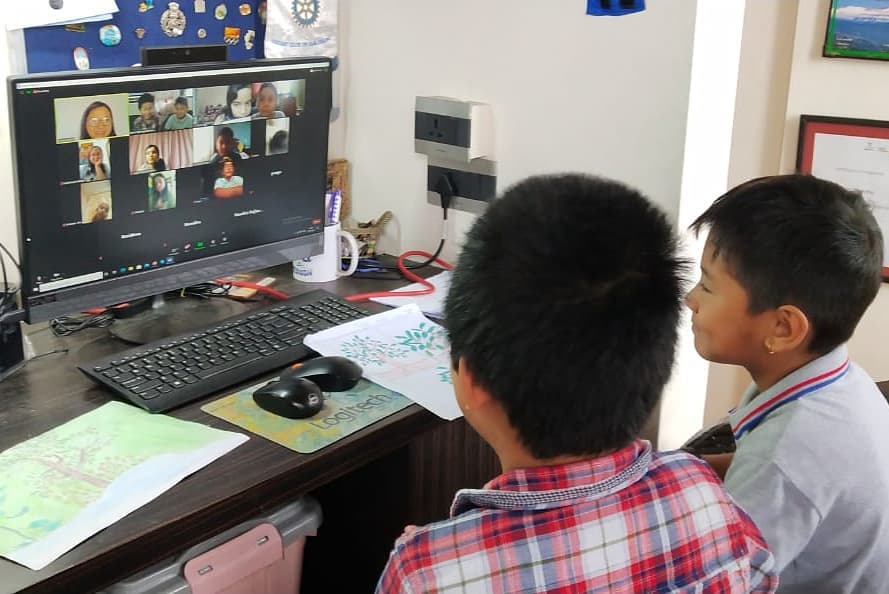GFF Nepal Representative Minket Lepcha on the power of storytelling, her journey to becoming a storyteller, and how she is using stories as a way to keep children connected during COVID-19 lockdown:
We are currently living in times where we need listeners more than speakers. Listeners who can listen from the heart and not from the head, who have the faculty of wonder, who remain content that we may not be able to get all the answers that we ask. Listeners to the stories narrated by weathered faces from time past. Those faces who witnessed environmental disasters, famines and human wars and have wrinkles that withstood times of monarchy, patriarchy, feudalism and vanity. And those experiences were wisely wrapped in stories meant to be told to generations thereafter. To be remembered, to be inspired, to learn from mistakes and to be wise. Storytelling is a marvellous process to create such listeners and is the oldest form of teaching. It bonded the first human communities, giving children the answers to the biggest questions of creation, life, and afterlife.
Having grown up in the Darjeeling Hills of Northern India, I belong to a generation where our parents do not know how to read and write, yet had stories to teach us. And of course, time to tell those stories. Storytelling is an ancient form of solving problems, creating influences and aspiring to generations and showing them crevices of hope in a timely way. Every single culture tells such stories.
My journey to tell stories started with a void in my understanding of myself and my community. Having not explored my community, I ventured to remote villages of Northern Sikkim in India, where most of my community, the Lepcha people live. I started documenting stories and folklore from elders and discovered indispensable love for nature that these elders exuded when narrating stories of Yeti, sacred mountain peaks like Khangchendzonga and sacred lakes. I found the close association with nature these people had an immaculate blueprint of the ecosystem that surrounded us, which inspired me to continue this teaching.
Furthermore, I experienced the absence of learning about the local environment in the education system while I was teaching in Darjeeling, India. The children were informed about the world but not their local surroundings. In one class, I asked children about the location of River Teesta, a large river that runs right through Darjeeling. They replied, ‘near a bridge, Miss!’
This reply led me to a bigger question of how we associate with nature and why haven’t we been able to connect these dots of interdependence in our education system. It has been more than seven years, and my journey which began as a documentation of these stories with the help of Acoustic Traditional (Salil Mukhia) has led to the dissemination of these stories to younger children about Nature through the medium of storytelling.

Drawing Celebrating Happy Friendship Day by Sakching
With the death of every elder in our village, we are losing rich knowledge. The sad part is that the documentation of this knowledge is not enough. It needs active participation and engagement between the elders and the youngsters of the village. But, as half of the youth move away from villages in the hope of a better future and better money, the elders often die with an untold story.
Working as a volunteer for Glenn Family Foundation gave me a perfect opportunity and platform to use these stories as a seed for the future generations to understand nature and ecosystems in these difficult times of COVID-19. As a GFF volunteer interning as the Child Development Society in Nepal, I have found the perfect opportunity to engage with children, create connection and seed love for nature through these stories. I have conducted sessions at Sreejanshil Rehabilitation and Special Education School for Disabled in Chandragiri, Janjagaran Primary School in Teen Ghare village in Kavre, and Baal Kumari School in Kathmandu.
However, when the COVID-19 pandemic and lockdown was announced in Nepal, these sessions were no longer viable. But, as the lockdown continued, there was a nagging desire to meet and connect despite the various challenges of social distancing and minimal movement.
So, every weekend on Saturday and Sunday, as a GFF HELPS Project, I started online storytelling sessions. Nikita Rai, GFF HELPS India Representative, helped me conduct these sessions. I often tell stories of the Himalaya to these children. There are times when Nikita comes as a character to help me narrate a story. The children who come are usually from age 8 to age 13/14, often recount stories of plants, animals and trees found in the Himalaya.

Drawing of a baby Hornbill made by Sakching Lepcha following a storytelling session about the Hornbill
The idea behind these storytelling sessions is to encourage engagements, conversations and celebrate curiosity and inquiry in these young minds. So, the children not only learn something about Nature but also learn about attributes like ‘forgiveness’, ‘letting go,’ ‘the fact that change is permanent’ ‘mistakes are not wrong,’ through the morals of the story. As the children are co-learning while interacting with me, they find solidarity among one another, no matter where they come from.
The children participating are from India and Nepal, and they send their drawings which are uploaded in a page called Rainbow Children of Himalaya on Facebook and Instagram. Towards the end of the story, we sometimes invite guest speakers. For example, we had Karishma Pradhan from Nature Conservation Foundation, India who shared facts of birds like Blue Throated Barbet, White Breasted Kingfisher and Great Hornbills.
As we are moving towards the sixth month of lockdown, we have found friendship in this virtual world. Every Saturday and Sunday, we connect and share.
What was even more empowering was to see representatives and volunteers from GFF Helps the Philippines and Sri Lanka taking forward the idea of storytelling and finding a way to engage with children of their country. We meet every week and discuss ideas together so that we get inspired and motivate one another. This step has led to another strong bond between the Volunteers and Representatives from The Philippines, Sri Lanka, Nepal and India.
By Minket Lepcha, GFF Nepal Representative


